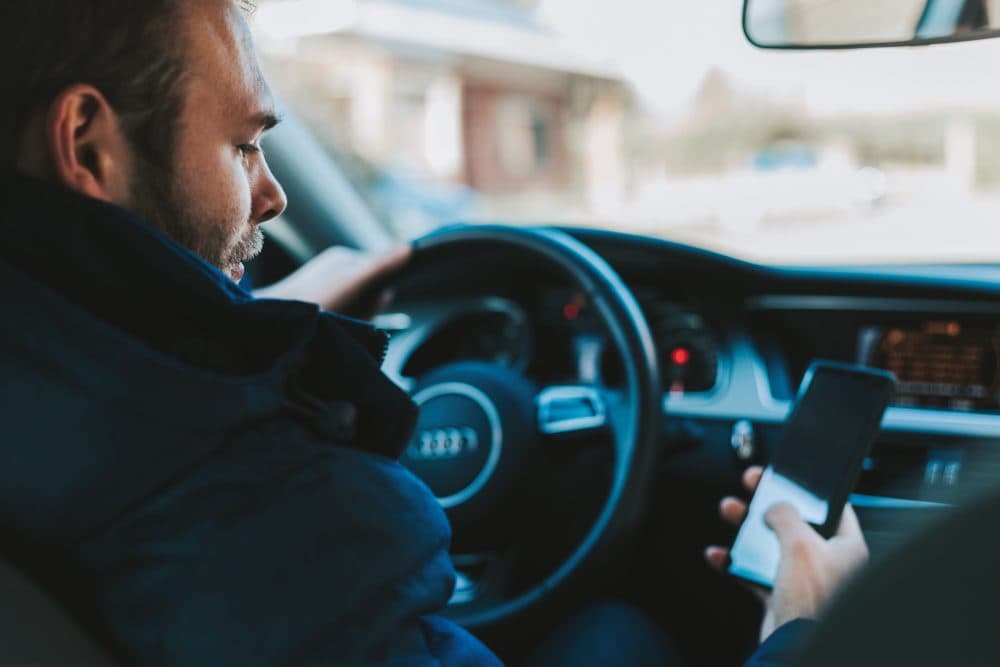Advertisement
Commentary
I'm A Pediatric Trauma Surgeon. Please Stop Texting And Driving

I am a pediatric trauma surgeon at Boston Children’s Hospital. Too often, I have taken care of children who are injured by distracted drivers and witnessed the effect it can have on their lives and the lives of their loved ones.
I am also someone who drives to work, and understand the pull of wanting to read a text or email while sitting in traffic. The temptation to keep up with our busy lives, which are increasingly conducted on our phones (during ever-longer commutes) is just too much.
In the past 50 years, we’ve made great progress in decreasing motor vehicle death rates, but those rates are up in recent years. The blame lands squarely on distracted driving.
Each year, distracted driving is responsible for more deaths than the 9/11 terror attacks. Today, one quarter of all motor vehicle fatalities and more than half of teen crashes are the result of distracted driving.
I recently cared for an adolescent girl who was hit by a car, while in a crosswalk, on her walk home from school.
The hazards of distracted driving are well known. Sending or reading a text takes the average driver’s eyes off of the road for five seconds, enough time to travel the length of a football field if you’re driving 55 miles per hour. Yet, current data suggests that more than one-fourth of drivers in Massachusetts routinely text and drive, despite our current laws. People fall victim to optimism bias — the idea that bad things won’t happen to them — and the inability of police to enforce our current texting ban reinforces that belief.
Science has shown that the most effective injury prevention strategies are changes in product design. But in lieu of changes to phone design — that would prevent their use while driving — a new law is the best response we have. I support the efforts underway on Beacon Hill to curtail distracted driving, because I see its effect on kids, and current laws are not strong enough to keep our kids safe. Senate Bill 1383, “An Act to Prevent Driver Distraction and Motor Vehicle Fatalities,” broadens the definition of “telephone” to include any kind of electronic device through which one can text, access social media, use a camera, etc. The bill also states that any device in use while driving must be in hands-free mode, and it includes stricter penalties for young drivers.
Fatalities and extreme life-threatening injuries due to distracted driving are preventable.
I’ve seen the aftermath of distracted driving first-hand. I recently cared for an adolescent girl who was hit by a car, while in a crosswalk, on her walk home from school. A teenage driver, who admitted he was looking at his phone at the time, struck her going 30 miles per hour without braking — dragging her under the car until he stopped. She was rushed to a local hospital where they found she had several broken bones, including a skull fracture, two broken bones poking out of her right calf and a broken left leg. She was sent to the Children’s Trauma Center at Boston Children’s Hospital for pediatric specialty care where she was treated by 10 different teams of doctors.
My patient survived. She was eventually discharged home, but was confined to a wheelchair for four months. She is the only child of a single father, and it was very difficult for him to get time off from work to make the many trips to Boston, and to afford the deductibles and uncompensated portions of his child’s ongoing care. My patient knows the boy who struck her, and was contacted by his family. His life was also changed for the worse that day.
Injuries like these don’t have to happen. Technology now available in many smart phones prevents their use while driving. The next steps for safer drivers would be the implementation of legislation that strictly outlaws hands-on usage and enforces penalties for drivers who take the risk of harming themselves or others by using a phone while driving. Fatalities and extreme life-threatening injuries due to distracted driving are preventable.
